PhD Dissertation Proposal: Solid Waste Management in Russia
VerifiedAdded on 2023/05/30
|40
|11409
|175
Thesis and Dissertation
AI Summary
This dissertation proposal outlines a comprehensive study on solid waste management in major cities of Russia. The proposal begins with an introduction highlighting the challenges posed by urban solid waste and its impact on environmental sustainability. It provides background information on the current state of waste management in Russia, including waste production rates, existing infrastructure, and government initiatives. The proposal also includes a literature review covering Corporate Social Responsibility (CSR), sustainability practices, and their application to waste management in Russia and globally. The methodology section details the research philosophy, approach, and methods to be employed, including both quantitative and qualitative research, case selection, data collection techniques (interviews, surveys, and observations), and data analysis methods. Ethical considerations are also addressed. The study aims to analyze the current state of waste management, identify problems, and propose sustainable solutions to improve waste management practices and promote environmental sustainability in Russian cities. The expected contribution of the study is to provide informed decision-making for policymakers and contribute to the development of efficient and economical solid waste management systems.
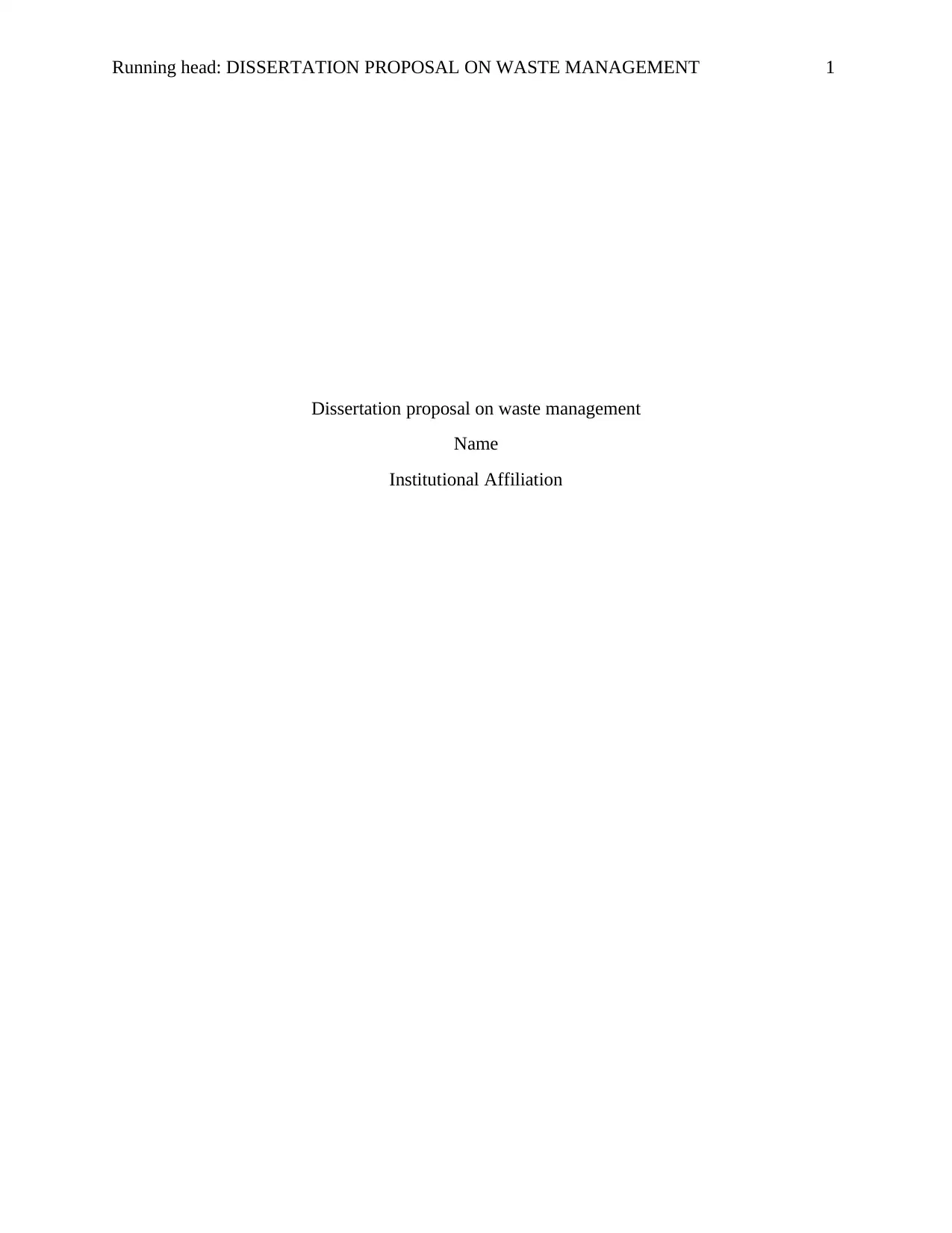
Running head: DISSERTATION PROPOSAL ON WASTE MANAGEMENT 1
Dissertation proposal on waste management
Name
Institutional Affiliation
Dissertation proposal on waste management
Name
Institutional Affiliation
Paraphrase This Document
Need a fresh take? Get an instant paraphrase of this document with our AI Paraphraser
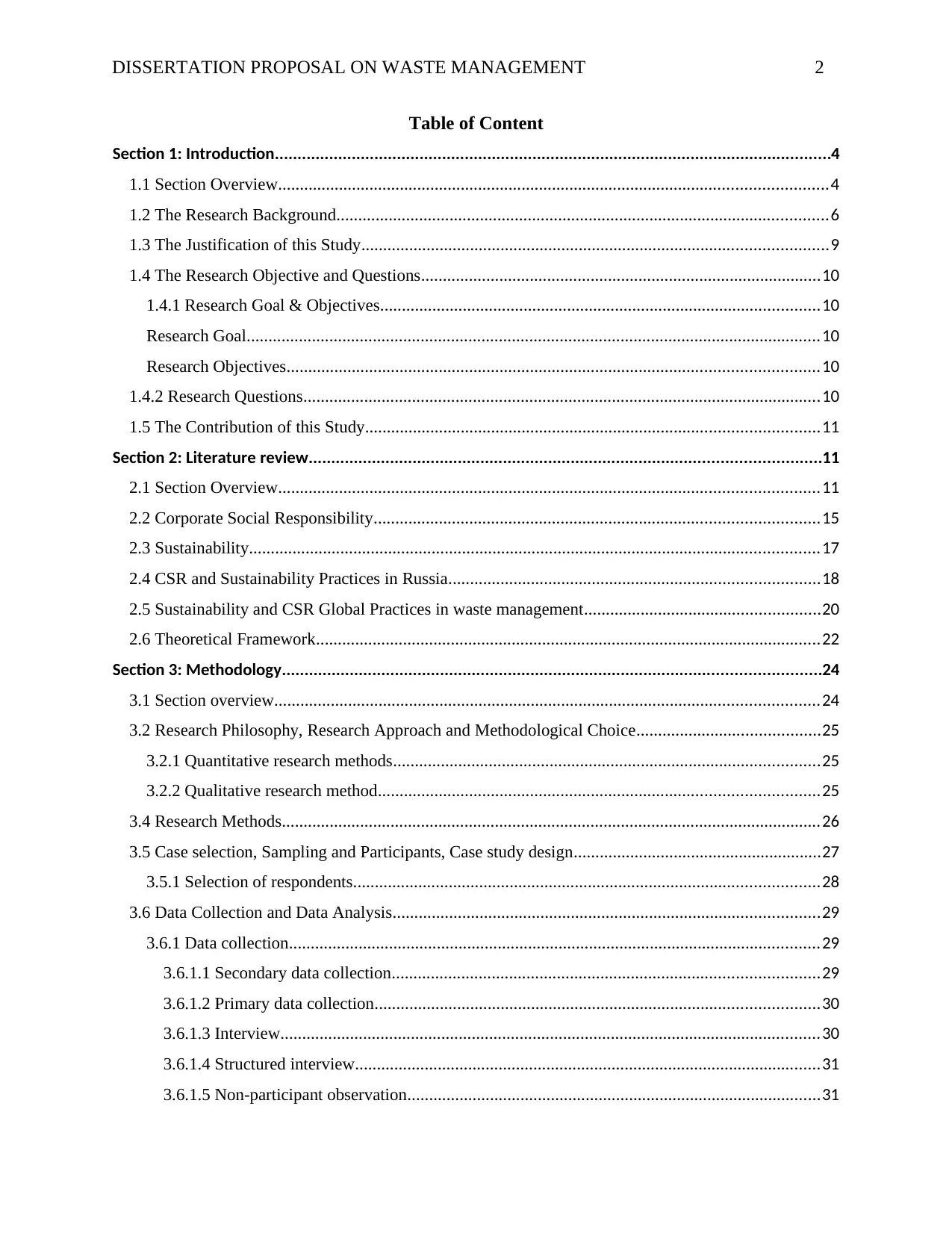
DISSERTATION PROPOSAL ON WASTE MANAGEMENT 2
Table of Content
Section 1: Introduction...........................................................................................................................4
1.1 Section Overview..............................................................................................................................4
1.2 The Research Background.................................................................................................................6
1.3 The Justification of this Study...........................................................................................................9
1.4 The Research Objective and Questions............................................................................................10
1.4.1 Research Goal & Objectives.....................................................................................................10
Research Goal....................................................................................................................................10
Research Objectives..........................................................................................................................10
1.4.2 Research Questions.......................................................................................................................10
1.5 The Contribution of this Study........................................................................................................11
Section 2: Literature review.................................................................................................................11
2.1 Section Overview............................................................................................................................11
2.2 Corporate Social Responsibility......................................................................................................15
2.3 Sustainability...................................................................................................................................17
2.4 CSR and Sustainability Practices in Russia.....................................................................................18
2.5 Sustainability and CSR Global Practices in waste management......................................................20
2.6 Theoretical Framework....................................................................................................................22
Section 3: Methodology.......................................................................................................................24
3.1 Section overview.............................................................................................................................24
3.2 Research Philosophy, Research Approach and Methodological Choice..........................................25
3.2.1 Quantitative research methods..................................................................................................25
3.2.2 Qualitative research method.....................................................................................................25
3.4 Research Methods............................................................................................................................26
3.5 Case selection, Sampling and Participants, Case study design.........................................................27
3.5.1 Selection of respondents...........................................................................................................28
3.6 Data Collection and Data Analysis..................................................................................................29
3.6.1 Data collection..........................................................................................................................29
3.6.1.1 Secondary data collection..................................................................................................29
3.6.1.2 Primary data collection......................................................................................................30
3.6.1.3 Interview............................................................................................................................30
3.6.1.4 Structured interview...........................................................................................................31
3.6.1.5 Non-participant observation...............................................................................................31
Table of Content
Section 1: Introduction...........................................................................................................................4
1.1 Section Overview..............................................................................................................................4
1.2 The Research Background.................................................................................................................6
1.3 The Justification of this Study...........................................................................................................9
1.4 The Research Objective and Questions............................................................................................10
1.4.1 Research Goal & Objectives.....................................................................................................10
Research Goal....................................................................................................................................10
Research Objectives..........................................................................................................................10
1.4.2 Research Questions.......................................................................................................................10
1.5 The Contribution of this Study........................................................................................................11
Section 2: Literature review.................................................................................................................11
2.1 Section Overview............................................................................................................................11
2.2 Corporate Social Responsibility......................................................................................................15
2.3 Sustainability...................................................................................................................................17
2.4 CSR and Sustainability Practices in Russia.....................................................................................18
2.5 Sustainability and CSR Global Practices in waste management......................................................20
2.6 Theoretical Framework....................................................................................................................22
Section 3: Methodology.......................................................................................................................24
3.1 Section overview.............................................................................................................................24
3.2 Research Philosophy, Research Approach and Methodological Choice..........................................25
3.2.1 Quantitative research methods..................................................................................................25
3.2.2 Qualitative research method.....................................................................................................25
3.4 Research Methods............................................................................................................................26
3.5 Case selection, Sampling and Participants, Case study design.........................................................27
3.5.1 Selection of respondents...........................................................................................................28
3.6 Data Collection and Data Analysis..................................................................................................29
3.6.1 Data collection..........................................................................................................................29
3.6.1.1 Secondary data collection..................................................................................................29
3.6.1.2 Primary data collection......................................................................................................30
3.6.1.3 Interview............................................................................................................................30
3.6.1.4 Structured interview...........................................................................................................31
3.6.1.5 Non-participant observation...............................................................................................31
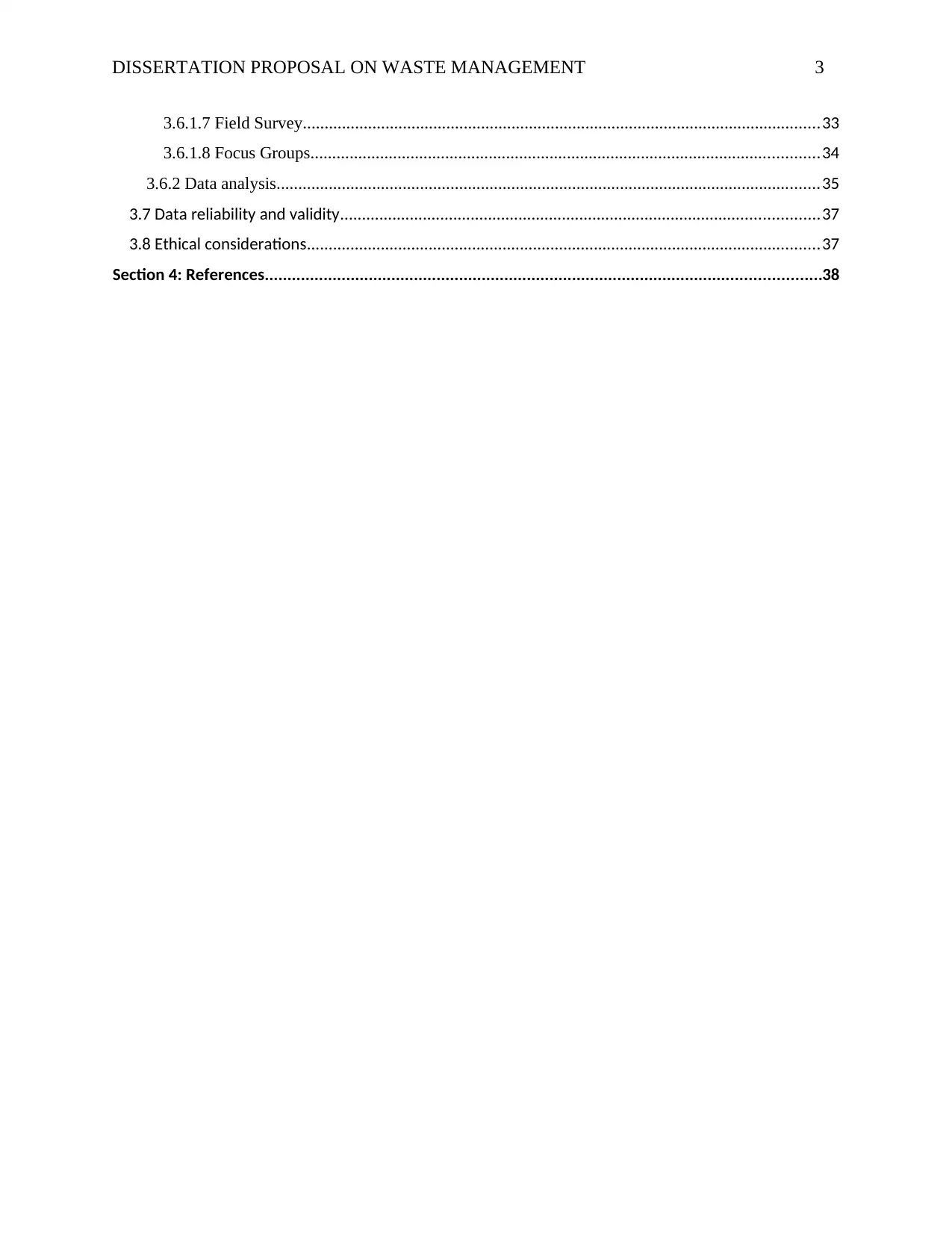
DISSERTATION PROPOSAL ON WASTE MANAGEMENT 3
3.6.1.7 Field Survey.......................................................................................................................33
3.6.1.8 Focus Groups.....................................................................................................................34
3.6.2 Data analysis.............................................................................................................................35
3.7 Data reliability and validity..............................................................................................................37
3.8 Ethical considerations......................................................................................................................37
Section 4: References...........................................................................................................................38
3.6.1.7 Field Survey.......................................................................................................................33
3.6.1.8 Focus Groups.....................................................................................................................34
3.6.2 Data analysis.............................................................................................................................35
3.7 Data reliability and validity..............................................................................................................37
3.8 Ethical considerations......................................................................................................................37
Section 4: References...........................................................................................................................38
⊘ This is a preview!⊘
Do you want full access?
Subscribe today to unlock all pages.

Trusted by 1+ million students worldwide
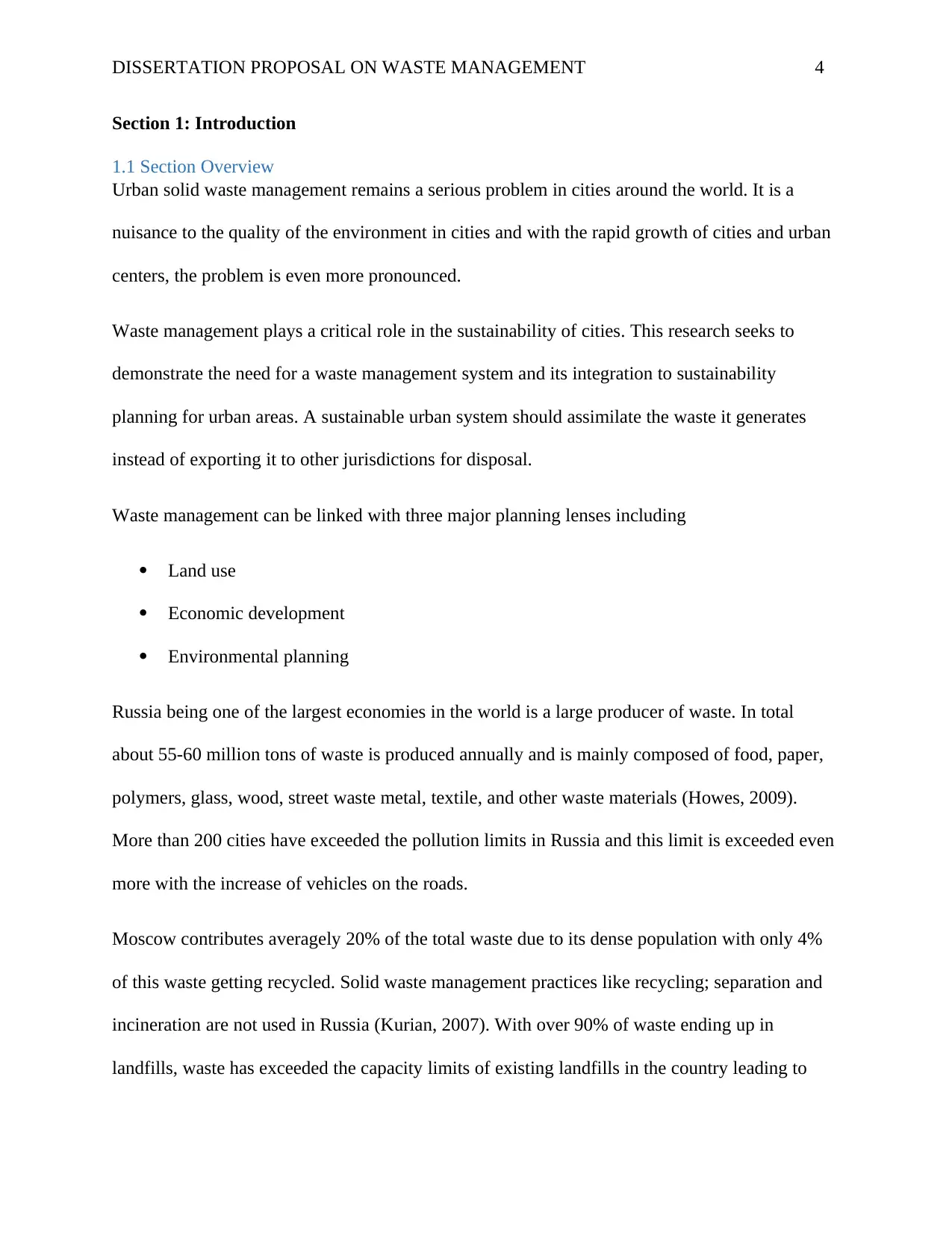
DISSERTATION PROPOSAL ON WASTE MANAGEMENT 4
Section 1: Introduction
1.1 Section Overview
Urban solid waste management remains a serious problem in cities around the world. It is a
nuisance to the quality of the environment in cities and with the rapid growth of cities and urban
centers, the problem is even more pronounced.
Waste management plays a critical role in the sustainability of cities. This research seeks to
demonstrate the need for a waste management system and its integration to sustainability
planning for urban areas. A sustainable urban system should assimilate the waste it generates
instead of exporting it to other jurisdictions for disposal.
Waste management can be linked with three major planning lenses including
Land use
Economic development
Environmental planning
Russia being one of the largest economies in the world is a large producer of waste. In total
about 55-60 million tons of waste is produced annually and is mainly composed of food, paper,
polymers, glass, wood, street waste metal, textile, and other waste materials (Howes, 2009).
More than 200 cities have exceeded the pollution limits in Russia and this limit is exceeded even
more with the increase of vehicles on the roads.
Moscow contributes averagely 20% of the total waste due to its dense population with only 4%
of this waste getting recycled. Solid waste management practices like recycling; separation and
incineration are not used in Russia (Kurian, 2007). With over 90% of waste ending up in
landfills, waste has exceeded the capacity limits of existing landfills in the country leading to
Section 1: Introduction
1.1 Section Overview
Urban solid waste management remains a serious problem in cities around the world. It is a
nuisance to the quality of the environment in cities and with the rapid growth of cities and urban
centers, the problem is even more pronounced.
Waste management plays a critical role in the sustainability of cities. This research seeks to
demonstrate the need for a waste management system and its integration to sustainability
planning for urban areas. A sustainable urban system should assimilate the waste it generates
instead of exporting it to other jurisdictions for disposal.
Waste management can be linked with three major planning lenses including
Land use
Economic development
Environmental planning
Russia being one of the largest economies in the world is a large producer of waste. In total
about 55-60 million tons of waste is produced annually and is mainly composed of food, paper,
polymers, glass, wood, street waste metal, textile, and other waste materials (Howes, 2009).
More than 200 cities have exceeded the pollution limits in Russia and this limit is exceeded even
more with the increase of vehicles on the roads.
Moscow contributes averagely 20% of the total waste due to its dense population with only 4%
of this waste getting recycled. Solid waste management practices like recycling; separation and
incineration are not used in Russia (Kurian, 2007). With over 90% of waste ending up in
landfills, waste has exceeded the capacity limits of existing landfills in the country leading to
Paraphrase This Document
Need a fresh take? Get an instant paraphrase of this document with our AI Paraphraser
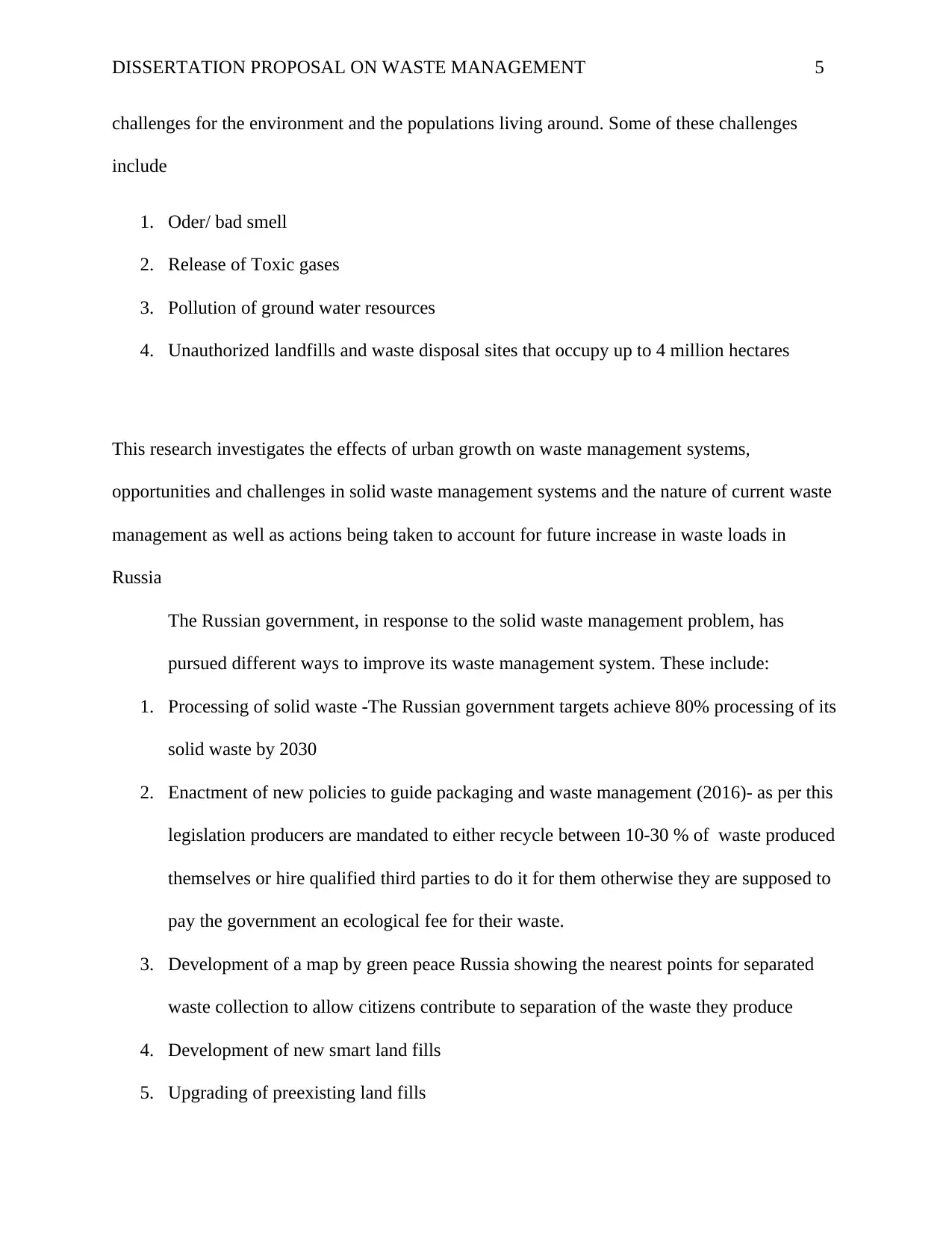
DISSERTATION PROPOSAL ON WASTE MANAGEMENT 5
challenges for the environment and the populations living around. Some of these challenges
include
1. Oder/ bad smell
2. Release of Toxic gases
3. Pollution of ground water resources
4. Unauthorized landfills and waste disposal sites that occupy up to 4 million hectares
This research investigates the effects of urban growth on waste management systems,
opportunities and challenges in solid waste management systems and the nature of current waste
management as well as actions being taken to account for future increase in waste loads in
Russia
The Russian government, in response to the solid waste management problem, has
pursued different ways to improve its waste management system. These include:
1. Processing of solid waste -The Russian government targets achieve 80% processing of its
solid waste by 2030
2. Enactment of new policies to guide packaging and waste management (2016)- as per this
legislation producers are mandated to either recycle between 10-30 % of waste produced
themselves or hire qualified third parties to do it for them otherwise they are supposed to
pay the government an ecological fee for their waste.
3. Development of a map by green peace Russia showing the nearest points for separated
waste collection to allow citizens contribute to separation of the waste they produce
4. Development of new smart land fills
5. Upgrading of preexisting land fills
challenges for the environment and the populations living around. Some of these challenges
include
1. Oder/ bad smell
2. Release of Toxic gases
3. Pollution of ground water resources
4. Unauthorized landfills and waste disposal sites that occupy up to 4 million hectares
This research investigates the effects of urban growth on waste management systems,
opportunities and challenges in solid waste management systems and the nature of current waste
management as well as actions being taken to account for future increase in waste loads in
Russia
The Russian government, in response to the solid waste management problem, has
pursued different ways to improve its waste management system. These include:
1. Processing of solid waste -The Russian government targets achieve 80% processing of its
solid waste by 2030
2. Enactment of new policies to guide packaging and waste management (2016)- as per this
legislation producers are mandated to either recycle between 10-30 % of waste produced
themselves or hire qualified third parties to do it for them otherwise they are supposed to
pay the government an ecological fee for their waste.
3. Development of a map by green peace Russia showing the nearest points for separated
waste collection to allow citizens contribute to separation of the waste they produce
4. Development of new smart land fills
5. Upgrading of preexisting land fills
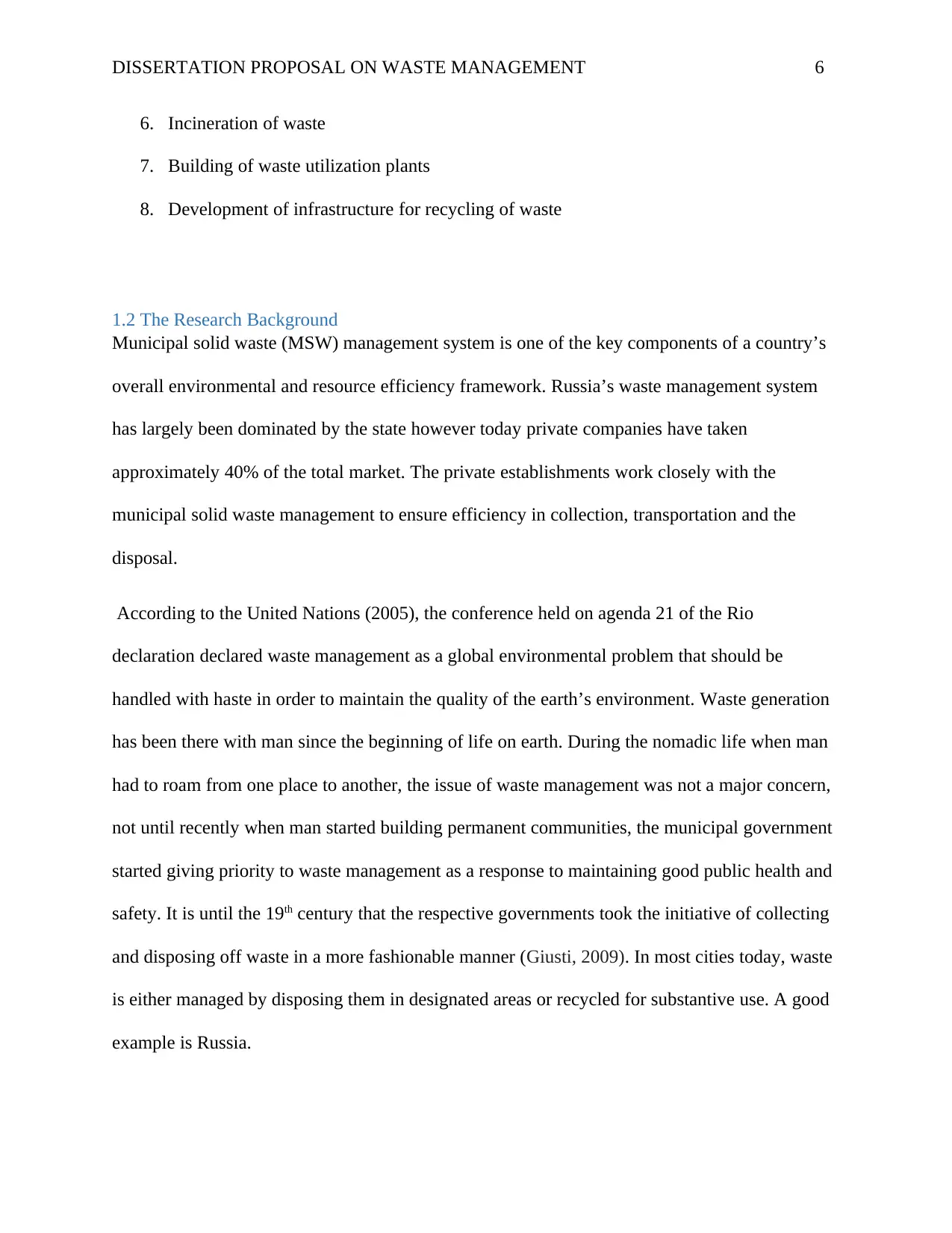
DISSERTATION PROPOSAL ON WASTE MANAGEMENT 6
6. Incineration of waste
7. Building of waste utilization plants
8. Development of infrastructure for recycling of waste
1.2 The Research Background
Municipal solid waste (MSW) management system is one of the key components of a country’s
overall environmental and resource efficiency framework. Russia’s waste management system
has largely been dominated by the state however today private companies have taken
approximately 40% of the total market. The private establishments work closely with the
municipal solid waste management to ensure efficiency in collection, transportation and the
disposal.
According to the United Nations (2005), the conference held on agenda 21 of the Rio
declaration declared waste management as a global environmental problem that should be
handled with haste in order to maintain the quality of the earth’s environment. Waste generation
has been there with man since the beginning of life on earth. During the nomadic life when man
had to roam from one place to another, the issue of waste management was not a major concern,
not until recently when man started building permanent communities, the municipal government
started giving priority to waste management as a response to maintaining good public health and
safety. It is until the 19th century that the respective governments took the initiative of collecting
and disposing off waste in a more fashionable manner (Giusti, 2009). In most cities today, waste
is either managed by disposing them in designated areas or recycled for substantive use. A good
example is Russia.
6. Incineration of waste
7. Building of waste utilization plants
8. Development of infrastructure for recycling of waste
1.2 The Research Background
Municipal solid waste (MSW) management system is one of the key components of a country’s
overall environmental and resource efficiency framework. Russia’s waste management system
has largely been dominated by the state however today private companies have taken
approximately 40% of the total market. The private establishments work closely with the
municipal solid waste management to ensure efficiency in collection, transportation and the
disposal.
According to the United Nations (2005), the conference held on agenda 21 of the Rio
declaration declared waste management as a global environmental problem that should be
handled with haste in order to maintain the quality of the earth’s environment. Waste generation
has been there with man since the beginning of life on earth. During the nomadic life when man
had to roam from one place to another, the issue of waste management was not a major concern,
not until recently when man started building permanent communities, the municipal government
started giving priority to waste management as a response to maintaining good public health and
safety. It is until the 19th century that the respective governments took the initiative of collecting
and disposing off waste in a more fashionable manner (Giusti, 2009). In most cities today, waste
is either managed by disposing them in designated areas or recycled for substantive use. A good
example is Russia.
⊘ This is a preview!⊘
Do you want full access?
Subscribe today to unlock all pages.

Trusted by 1+ million students worldwide
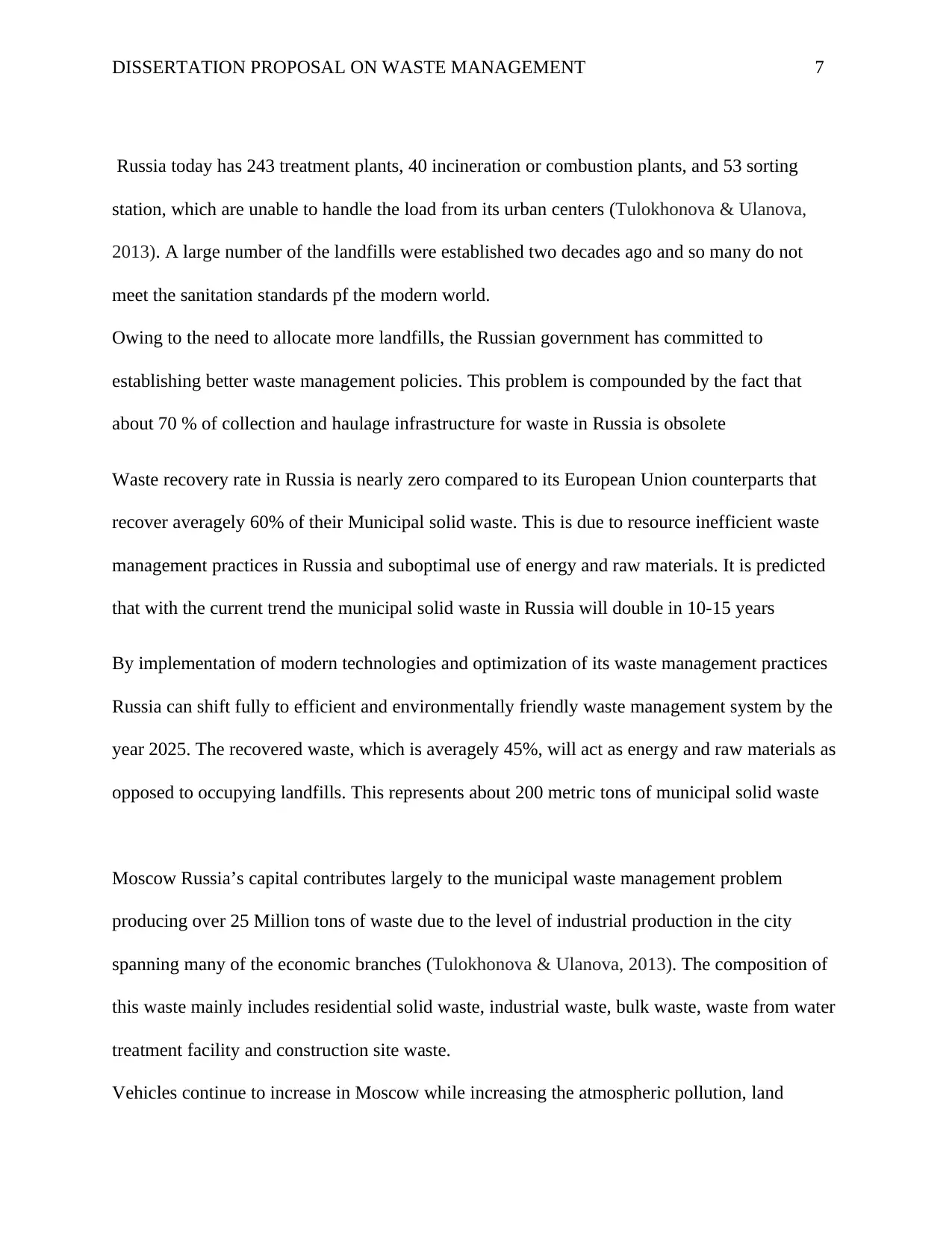
DISSERTATION PROPOSAL ON WASTE MANAGEMENT 7
Russia today has 243 treatment plants, 40 incineration or combustion plants, and 53 sorting
station, which are unable to handle the load from its urban centers (Tulokhonova & Ulanova,
2013). A large number of the landfills were established two decades ago and so many do not
meet the sanitation standards pf the modern world.
Owing to the need to allocate more landfills, the Russian government has committed to
establishing better waste management policies. This problem is compounded by the fact that
about 70 % of collection and haulage infrastructure for waste in Russia is obsolete
Waste recovery rate in Russia is nearly zero compared to its European Union counterparts that
recover averagely 60% of their Municipal solid waste. This is due to resource inefficient waste
management practices in Russia and suboptimal use of energy and raw materials. It is predicted
that with the current trend the municipal solid waste in Russia will double in 10-15 years
By implementation of modern technologies and optimization of its waste management practices
Russia can shift fully to efficient and environmentally friendly waste management system by the
year 2025. The recovered waste, which is averagely 45%, will act as energy and raw materials as
opposed to occupying landfills. This represents about 200 metric tons of municipal solid waste
Moscow Russia’s capital contributes largely to the municipal waste management problem
producing over 25 Million tons of waste due to the level of industrial production in the city
spanning many of the economic branches (Tulokhonova & Ulanova, 2013). The composition of
this waste mainly includes residential solid waste, industrial waste, bulk waste, waste from water
treatment facility and construction site waste.
Vehicles continue to increase in Moscow while increasing the atmospheric pollution, land
Russia today has 243 treatment plants, 40 incineration or combustion plants, and 53 sorting
station, which are unable to handle the load from its urban centers (Tulokhonova & Ulanova,
2013). A large number of the landfills were established two decades ago and so many do not
meet the sanitation standards pf the modern world.
Owing to the need to allocate more landfills, the Russian government has committed to
establishing better waste management policies. This problem is compounded by the fact that
about 70 % of collection and haulage infrastructure for waste in Russia is obsolete
Waste recovery rate in Russia is nearly zero compared to its European Union counterparts that
recover averagely 60% of their Municipal solid waste. This is due to resource inefficient waste
management practices in Russia and suboptimal use of energy and raw materials. It is predicted
that with the current trend the municipal solid waste in Russia will double in 10-15 years
By implementation of modern technologies and optimization of its waste management practices
Russia can shift fully to efficient and environmentally friendly waste management system by the
year 2025. The recovered waste, which is averagely 45%, will act as energy and raw materials as
opposed to occupying landfills. This represents about 200 metric tons of municipal solid waste
Moscow Russia’s capital contributes largely to the municipal waste management problem
producing over 25 Million tons of waste due to the level of industrial production in the city
spanning many of the economic branches (Tulokhonova & Ulanova, 2013). The composition of
this waste mainly includes residential solid waste, industrial waste, bulk waste, waste from water
treatment facility and construction site waste.
Vehicles continue to increase in Moscow while increasing the atmospheric pollution, land
Paraphrase This Document
Need a fresh take? Get an instant paraphrase of this document with our AI Paraphraser
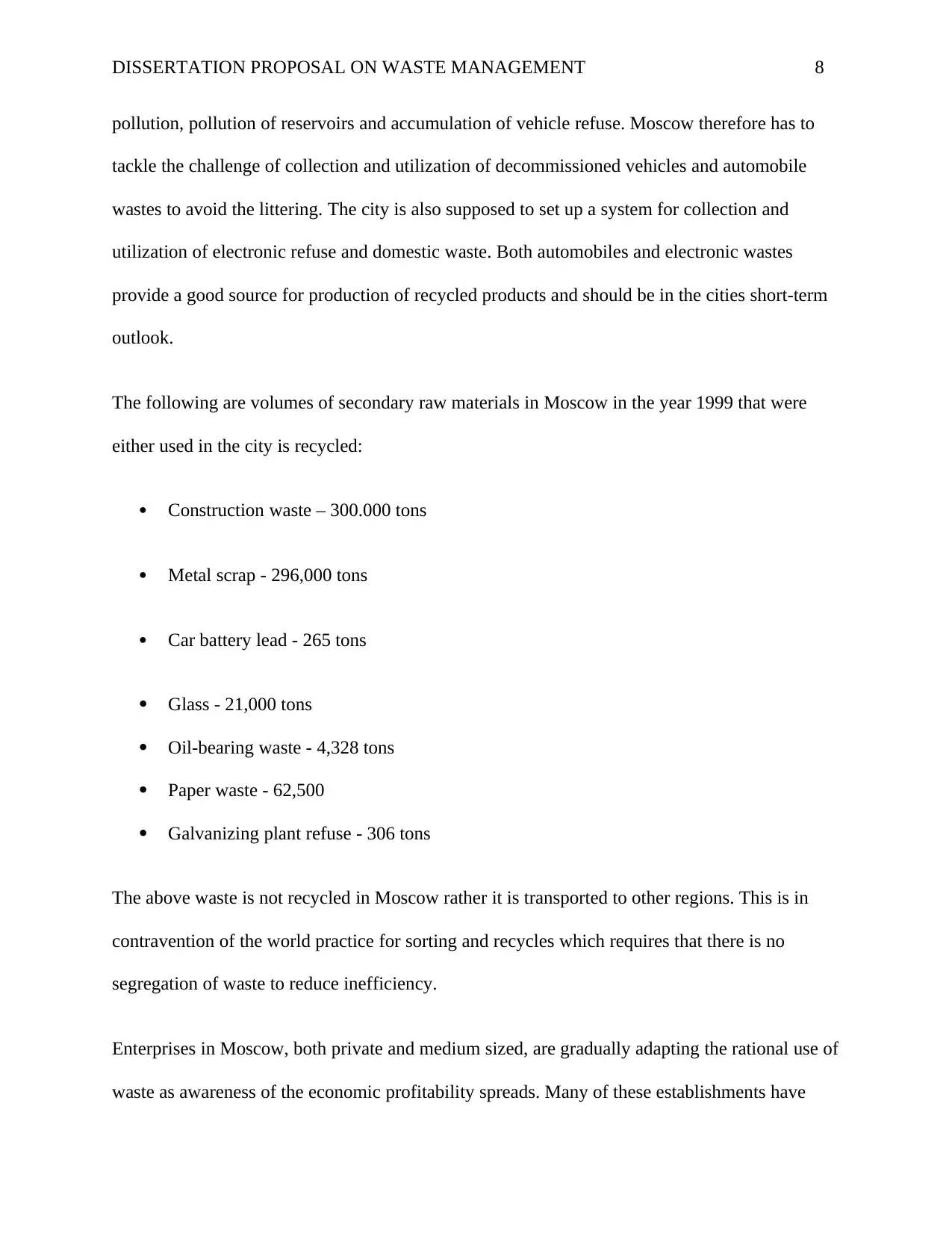
DISSERTATION PROPOSAL ON WASTE MANAGEMENT 8
pollution, pollution of reservoirs and accumulation of vehicle refuse. Moscow therefore has to
tackle the challenge of collection and utilization of decommissioned vehicles and automobile
wastes to avoid the littering. The city is also supposed to set up a system for collection and
utilization of electronic refuse and domestic waste. Both automobiles and electronic wastes
provide a good source for production of recycled products and should be in the cities short-term
outlook.
The following are volumes of secondary raw materials in Moscow in the year 1999 that were
either used in the city is recycled:
Construction waste – 300.000 tons
Metal scrap - 296,000 tons
Car battery lead - 265 tons
Glass - 21,000 tons
Oil-bearing waste - 4,328 tons
Paper waste - 62,500
Galvanizing plant refuse - 306 tons
The above waste is not recycled in Moscow rather it is transported to other regions. This is in
contravention of the world practice for sorting and recycles which requires that there is no
segregation of waste to reduce inefficiency.
Enterprises in Moscow, both private and medium sized, are gradually adapting the rational use of
waste as awareness of the economic profitability spreads. Many of these establishments have
pollution, pollution of reservoirs and accumulation of vehicle refuse. Moscow therefore has to
tackle the challenge of collection and utilization of decommissioned vehicles and automobile
wastes to avoid the littering. The city is also supposed to set up a system for collection and
utilization of electronic refuse and domestic waste. Both automobiles and electronic wastes
provide a good source for production of recycled products and should be in the cities short-term
outlook.
The following are volumes of secondary raw materials in Moscow in the year 1999 that were
either used in the city is recycled:
Construction waste – 300.000 tons
Metal scrap - 296,000 tons
Car battery lead - 265 tons
Glass - 21,000 tons
Oil-bearing waste - 4,328 tons
Paper waste - 62,500
Galvanizing plant refuse - 306 tons
The above waste is not recycled in Moscow rather it is transported to other regions. This is in
contravention of the world practice for sorting and recycles which requires that there is no
segregation of waste to reduce inefficiency.
Enterprises in Moscow, both private and medium sized, are gradually adapting the rational use of
waste as awareness of the economic profitability spreads. Many of these establishments have
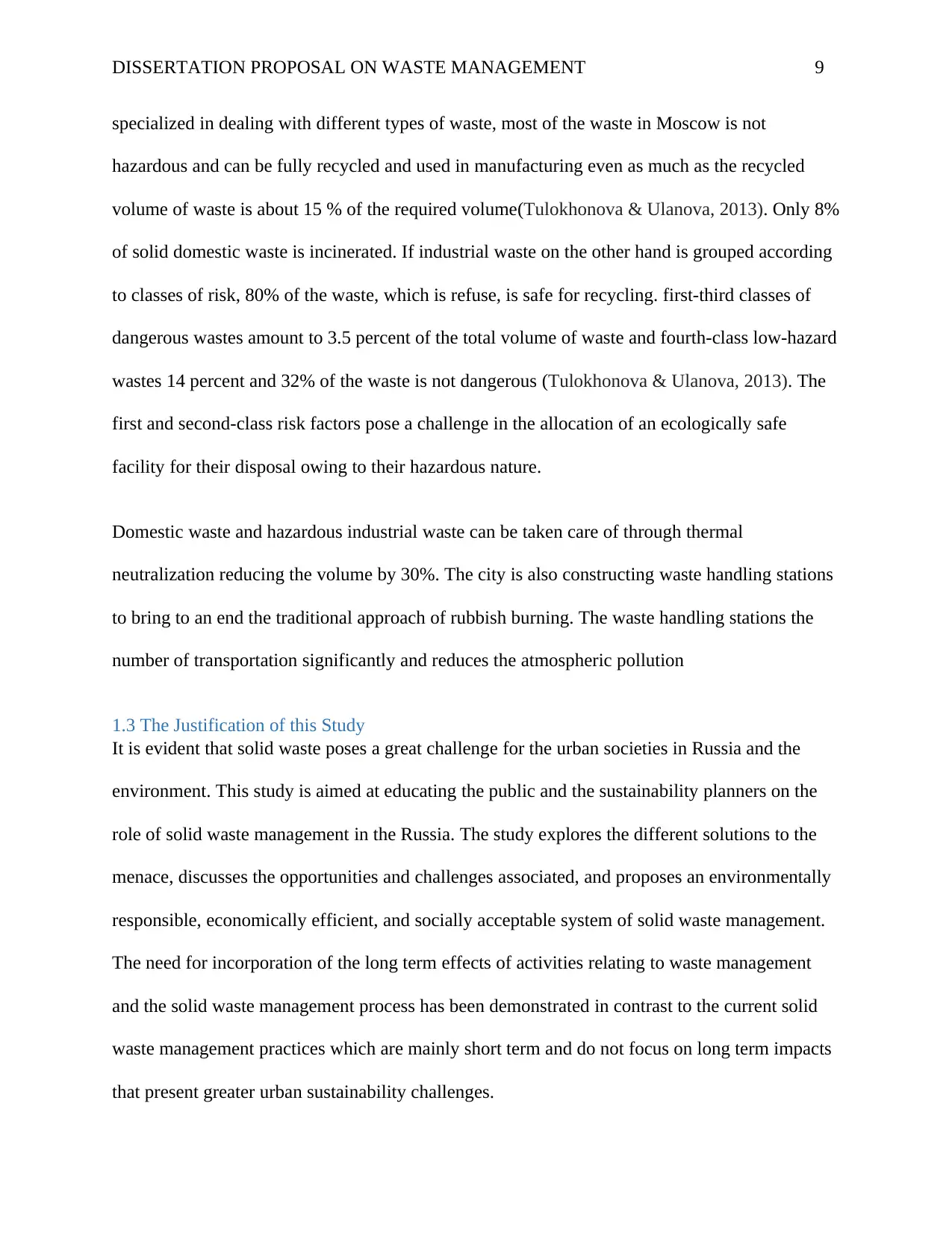
DISSERTATION PROPOSAL ON WASTE MANAGEMENT 9
specialized in dealing with different types of waste, most of the waste in Moscow is not
hazardous and can be fully recycled and used in manufacturing even as much as the recycled
volume of waste is about 15 % of the required volume(Tulokhonova & Ulanova, 2013). Only 8%
of solid domestic waste is incinerated. If industrial waste on the other hand is grouped according
to classes of risk, 80% of the waste, which is refuse, is safe for recycling. first-third classes of
dangerous wastes amount to 3.5 percent of the total volume of waste and fourth-class low-hazard
wastes 14 percent and 32% of the waste is not dangerous (Tulokhonova & Ulanova, 2013). The
first and second-class risk factors pose a challenge in the allocation of an ecologically safe
facility for their disposal owing to their hazardous nature.
Domestic waste and hazardous industrial waste can be taken care of through thermal
neutralization reducing the volume by 30%. The city is also constructing waste handling stations
to bring to an end the traditional approach of rubbish burning. The waste handling stations the
number of transportation significantly and reduces the atmospheric pollution
1.3 The Justification of this Study
It is evident that solid waste poses a great challenge for the urban societies in Russia and the
environment. This study is aimed at educating the public and the sustainability planners on the
role of solid waste management in the Russia. The study explores the different solutions to the
menace, discusses the opportunities and challenges associated, and proposes an environmentally
responsible, economically efficient, and socially acceptable system of solid waste management.
The need for incorporation of the long term effects of activities relating to waste management
and the solid waste management process has been demonstrated in contrast to the current solid
waste management practices which are mainly short term and do not focus on long term impacts
that present greater urban sustainability challenges.
specialized in dealing with different types of waste, most of the waste in Moscow is not
hazardous and can be fully recycled and used in manufacturing even as much as the recycled
volume of waste is about 15 % of the required volume(Tulokhonova & Ulanova, 2013). Only 8%
of solid domestic waste is incinerated. If industrial waste on the other hand is grouped according
to classes of risk, 80% of the waste, which is refuse, is safe for recycling. first-third classes of
dangerous wastes amount to 3.5 percent of the total volume of waste and fourth-class low-hazard
wastes 14 percent and 32% of the waste is not dangerous (Tulokhonova & Ulanova, 2013). The
first and second-class risk factors pose a challenge in the allocation of an ecologically safe
facility for their disposal owing to their hazardous nature.
Domestic waste and hazardous industrial waste can be taken care of through thermal
neutralization reducing the volume by 30%. The city is also constructing waste handling stations
to bring to an end the traditional approach of rubbish burning. The waste handling stations the
number of transportation significantly and reduces the atmospheric pollution
1.3 The Justification of this Study
It is evident that solid waste poses a great challenge for the urban societies in Russia and the
environment. This study is aimed at educating the public and the sustainability planners on the
role of solid waste management in the Russia. The study explores the different solutions to the
menace, discusses the opportunities and challenges associated, and proposes an environmentally
responsible, economically efficient, and socially acceptable system of solid waste management.
The need for incorporation of the long term effects of activities relating to waste management
and the solid waste management process has been demonstrated in contrast to the current solid
waste management practices which are mainly short term and do not focus on long term impacts
that present greater urban sustainability challenges.
⊘ This is a preview!⊘
Do you want full access?
Subscribe today to unlock all pages.

Trusted by 1+ million students worldwide
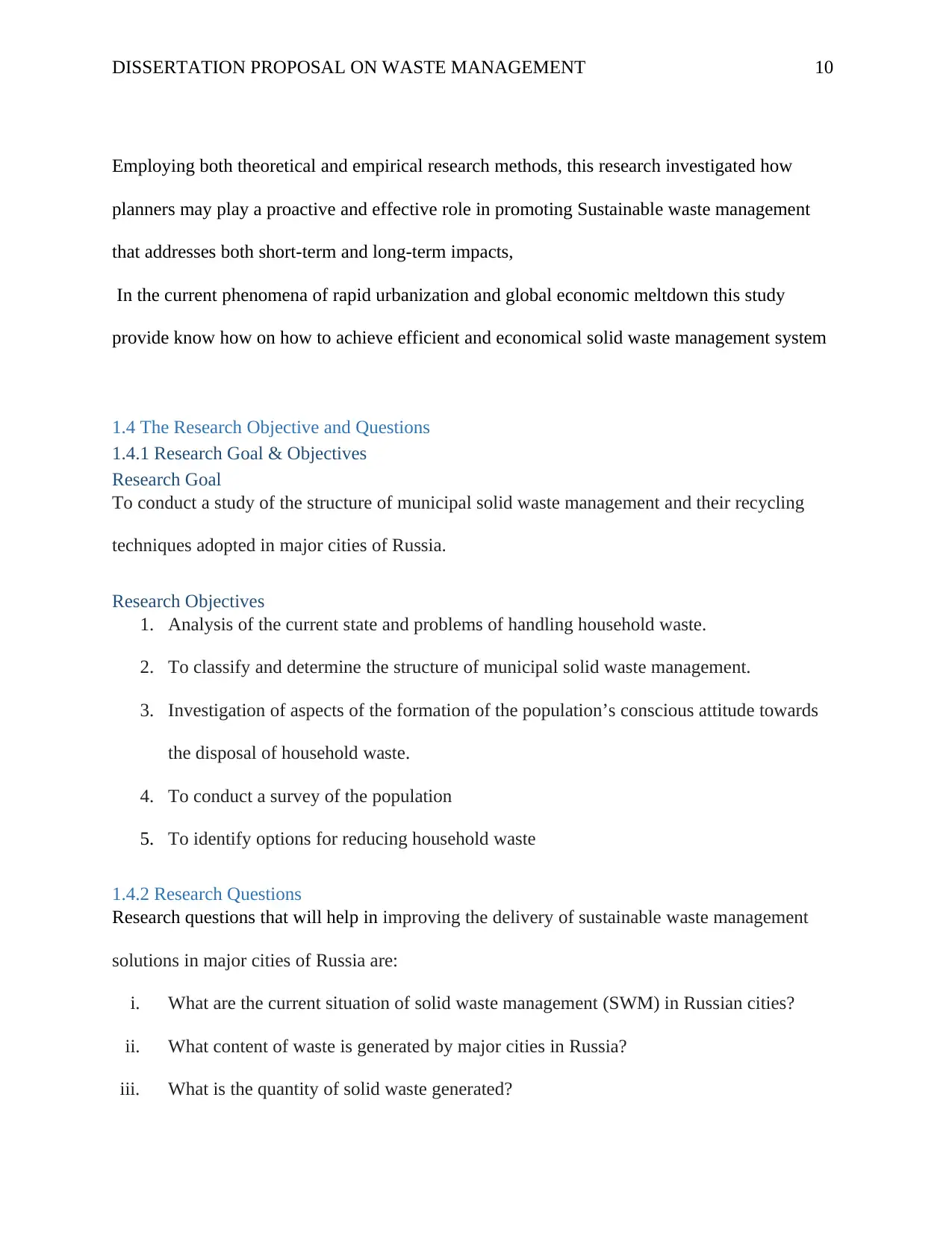
DISSERTATION PROPOSAL ON WASTE MANAGEMENT 10
Employing both theoretical and empirical research methods, this research investigated how
planners may play a proactive and effective role in promoting Sustainable waste management
that addresses both short-term and long-term impacts,
In the current phenomena of rapid urbanization and global economic meltdown this study
provide know how on how to achieve efficient and economical solid waste management system
1.4 The Research Objective and Questions
1.4.1 Research Goal & Objectives
Research Goal
To conduct a study of the structure of municipal solid waste management and their recycling
techniques adopted in major cities of Russia.
Research Objectives
1. Analysis of the current state and problems of handling household waste.
2. To classify and determine the structure of municipal solid waste management.
3. Investigation of aspects of the formation of the population’s conscious attitude towards
the disposal of household waste.
4. To conduct a survey of the population
5. To identify options for reducing household waste
1.4.2 Research Questions
Research questions that will help in improving the delivery of sustainable waste management
solutions in major cities of Russia are:
i. What are the current situation of solid waste management (SWM) in Russian cities?
ii. What content of waste is generated by major cities in Russia?
iii. What is the quantity of solid waste generated?
Employing both theoretical and empirical research methods, this research investigated how
planners may play a proactive and effective role in promoting Sustainable waste management
that addresses both short-term and long-term impacts,
In the current phenomena of rapid urbanization and global economic meltdown this study
provide know how on how to achieve efficient and economical solid waste management system
1.4 The Research Objective and Questions
1.4.1 Research Goal & Objectives
Research Goal
To conduct a study of the structure of municipal solid waste management and their recycling
techniques adopted in major cities of Russia.
Research Objectives
1. Analysis of the current state and problems of handling household waste.
2. To classify and determine the structure of municipal solid waste management.
3. Investigation of aspects of the formation of the population’s conscious attitude towards
the disposal of household waste.
4. To conduct a survey of the population
5. To identify options for reducing household waste
1.4.2 Research Questions
Research questions that will help in improving the delivery of sustainable waste management
solutions in major cities of Russia are:
i. What are the current situation of solid waste management (SWM) in Russian cities?
ii. What content of waste is generated by major cities in Russia?
iii. What is the quantity of solid waste generated?
Paraphrase This Document
Need a fresh take? Get an instant paraphrase of this document with our AI Paraphraser
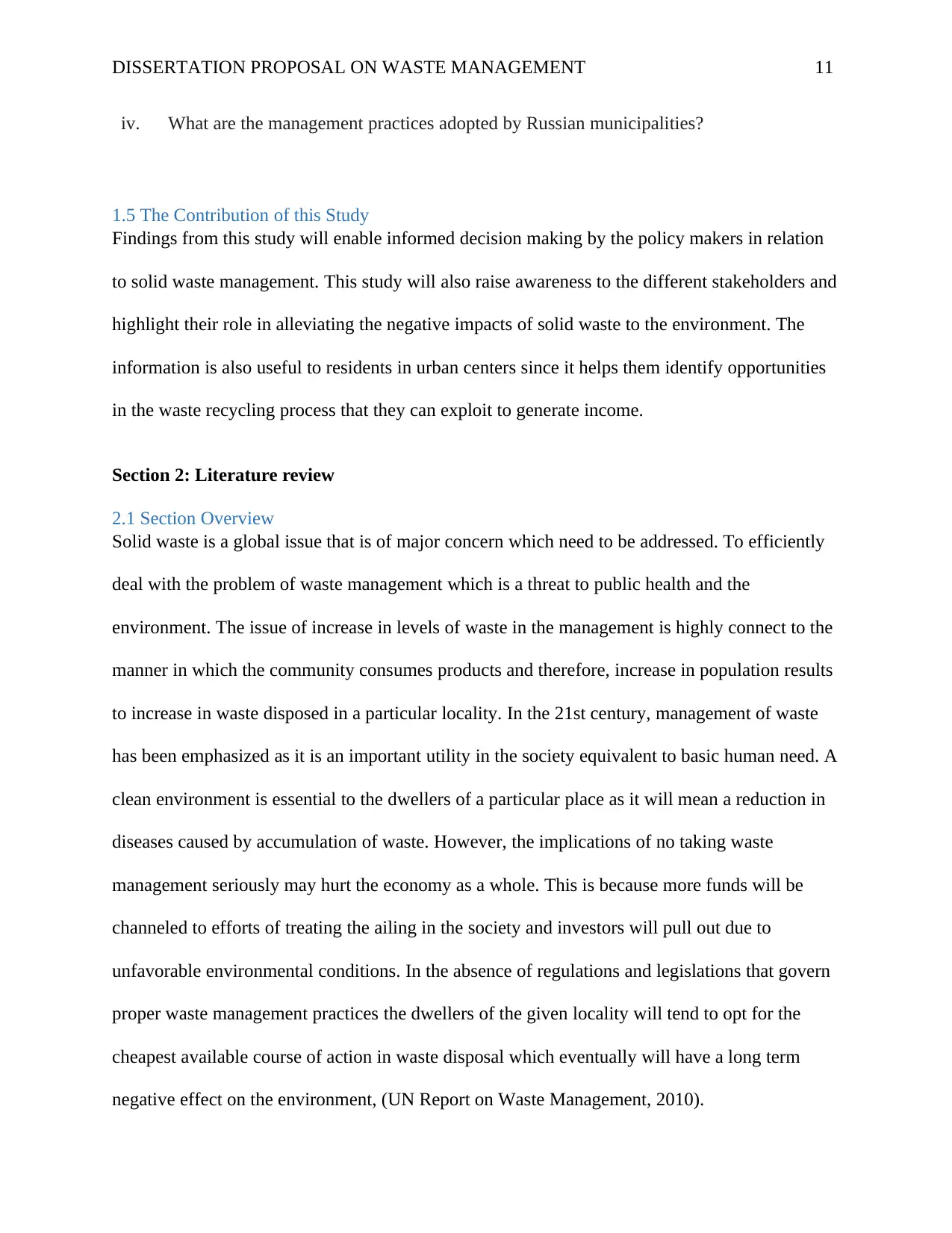
DISSERTATION PROPOSAL ON WASTE MANAGEMENT 11
iv. What are the management practices adopted by Russian municipalities?
1.5 The Contribution of this Study
Findings from this study will enable informed decision making by the policy makers in relation
to solid waste management. This study will also raise awareness to the different stakeholders and
highlight their role in alleviating the negative impacts of solid waste to the environment. The
information is also useful to residents in urban centers since it helps them identify opportunities
in the waste recycling process that they can exploit to generate income.
Section 2: Literature review
2.1 Section Overview
Solid waste is a global issue that is of major concern which need to be addressed. To efficiently
deal with the problem of waste management which is a threat to public health and the
environment. The issue of increase in levels of waste in the management is highly connect to the
manner in which the community consumes products and therefore, increase in population results
to increase in waste disposed in a particular locality. In the 21st century, management of waste
has been emphasized as it is an important utility in the society equivalent to basic human need. A
clean environment is essential to the dwellers of a particular place as it will mean a reduction in
diseases caused by accumulation of waste. However, the implications of no taking waste
management seriously may hurt the economy as a whole. This is because more funds will be
channeled to efforts of treating the ailing in the society and investors will pull out due to
unfavorable environmental conditions. In the absence of regulations and legislations that govern
proper waste management practices the dwellers of the given locality will tend to opt for the
cheapest available course of action in waste disposal which eventually will have a long term
negative effect on the environment, (UN Report on Waste Management, 2010).
iv. What are the management practices adopted by Russian municipalities?
1.5 The Contribution of this Study
Findings from this study will enable informed decision making by the policy makers in relation
to solid waste management. This study will also raise awareness to the different stakeholders and
highlight their role in alleviating the negative impacts of solid waste to the environment. The
information is also useful to residents in urban centers since it helps them identify opportunities
in the waste recycling process that they can exploit to generate income.
Section 2: Literature review
2.1 Section Overview
Solid waste is a global issue that is of major concern which need to be addressed. To efficiently
deal with the problem of waste management which is a threat to public health and the
environment. The issue of increase in levels of waste in the management is highly connect to the
manner in which the community consumes products and therefore, increase in population results
to increase in waste disposed in a particular locality. In the 21st century, management of waste
has been emphasized as it is an important utility in the society equivalent to basic human need. A
clean environment is essential to the dwellers of a particular place as it will mean a reduction in
diseases caused by accumulation of waste. However, the implications of no taking waste
management seriously may hurt the economy as a whole. This is because more funds will be
channeled to efforts of treating the ailing in the society and investors will pull out due to
unfavorable environmental conditions. In the absence of regulations and legislations that govern
proper waste management practices the dwellers of the given locality will tend to opt for the
cheapest available course of action in waste disposal which eventually will have a long term
negative effect on the environment, (UN Report on Waste Management, 2010).
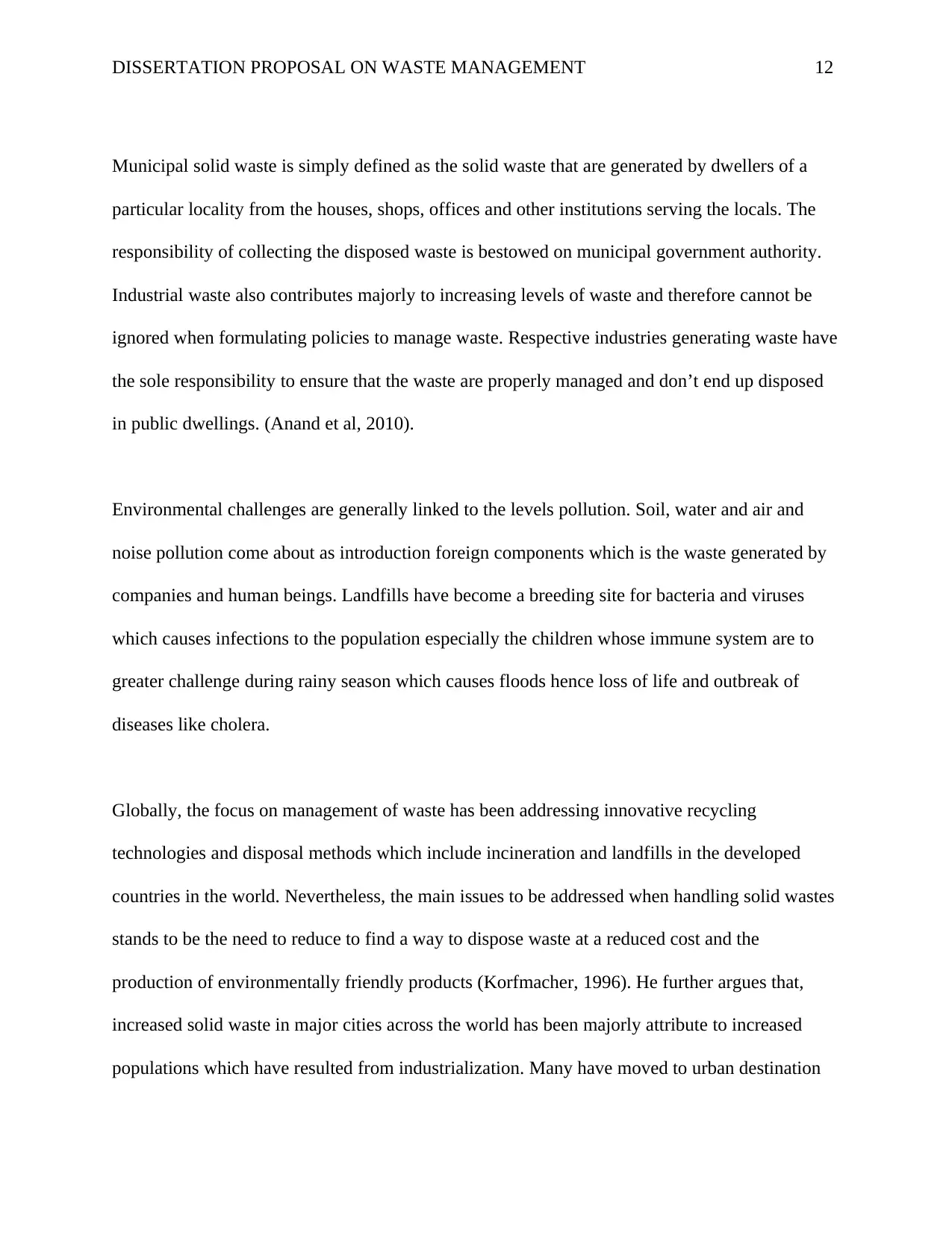
DISSERTATION PROPOSAL ON WASTE MANAGEMENT 12
Municipal solid waste is simply defined as the solid waste that are generated by dwellers of a
particular locality from the houses, shops, offices and other institutions serving the locals. The
responsibility of collecting the disposed waste is bestowed on municipal government authority.
Industrial waste also contributes majorly to increasing levels of waste and therefore cannot be
ignored when formulating policies to manage waste. Respective industries generating waste have
the sole responsibility to ensure that the waste are properly managed and don’t end up disposed
in public dwellings. (Anand et al, 2010).
Environmental challenges are generally linked to the levels pollution. Soil, water and air and
noise pollution come about as introduction foreign components which is the waste generated by
companies and human beings. Landfills have become a breeding site for bacteria and viruses
which causes infections to the population especially the children whose immune system are to
greater challenge during rainy season which causes floods hence loss of life and outbreak of
diseases like cholera.
Globally, the focus on management of waste has been addressing innovative recycling
technologies and disposal methods which include incineration and landfills in the developed
countries in the world. Nevertheless, the main issues to be addressed when handling solid wastes
stands to be the need to reduce to find a way to dispose waste at a reduced cost and the
production of environmentally friendly products (Korfmacher, 1996). He further argues that,
increased solid waste in major cities across the world has been majorly attribute to increased
populations which have resulted from industrialization. Many have moved to urban destination
Municipal solid waste is simply defined as the solid waste that are generated by dwellers of a
particular locality from the houses, shops, offices and other institutions serving the locals. The
responsibility of collecting the disposed waste is bestowed on municipal government authority.
Industrial waste also contributes majorly to increasing levels of waste and therefore cannot be
ignored when formulating policies to manage waste. Respective industries generating waste have
the sole responsibility to ensure that the waste are properly managed and don’t end up disposed
in public dwellings. (Anand et al, 2010).
Environmental challenges are generally linked to the levels pollution. Soil, water and air and
noise pollution come about as introduction foreign components which is the waste generated by
companies and human beings. Landfills have become a breeding site for bacteria and viruses
which causes infections to the population especially the children whose immune system are to
greater challenge during rainy season which causes floods hence loss of life and outbreak of
diseases like cholera.
Globally, the focus on management of waste has been addressing innovative recycling
technologies and disposal methods which include incineration and landfills in the developed
countries in the world. Nevertheless, the main issues to be addressed when handling solid wastes
stands to be the need to reduce to find a way to dispose waste at a reduced cost and the
production of environmentally friendly products (Korfmacher, 1996). He further argues that,
increased solid waste in major cities across the world has been majorly attribute to increased
populations which have resulted from industrialization. Many have moved to urban destination
⊘ This is a preview!⊘
Do you want full access?
Subscribe today to unlock all pages.

Trusted by 1+ million students worldwide
1 out of 40
Related Documents
Your All-in-One AI-Powered Toolkit for Academic Success.
+13062052269
info@desklib.com
Available 24*7 on WhatsApp / Email
![[object Object]](/_next/static/media/star-bottom.7253800d.svg)
Unlock your academic potential
Copyright © 2020–2026 A2Z Services. All Rights Reserved. Developed and managed by ZUCOL.





